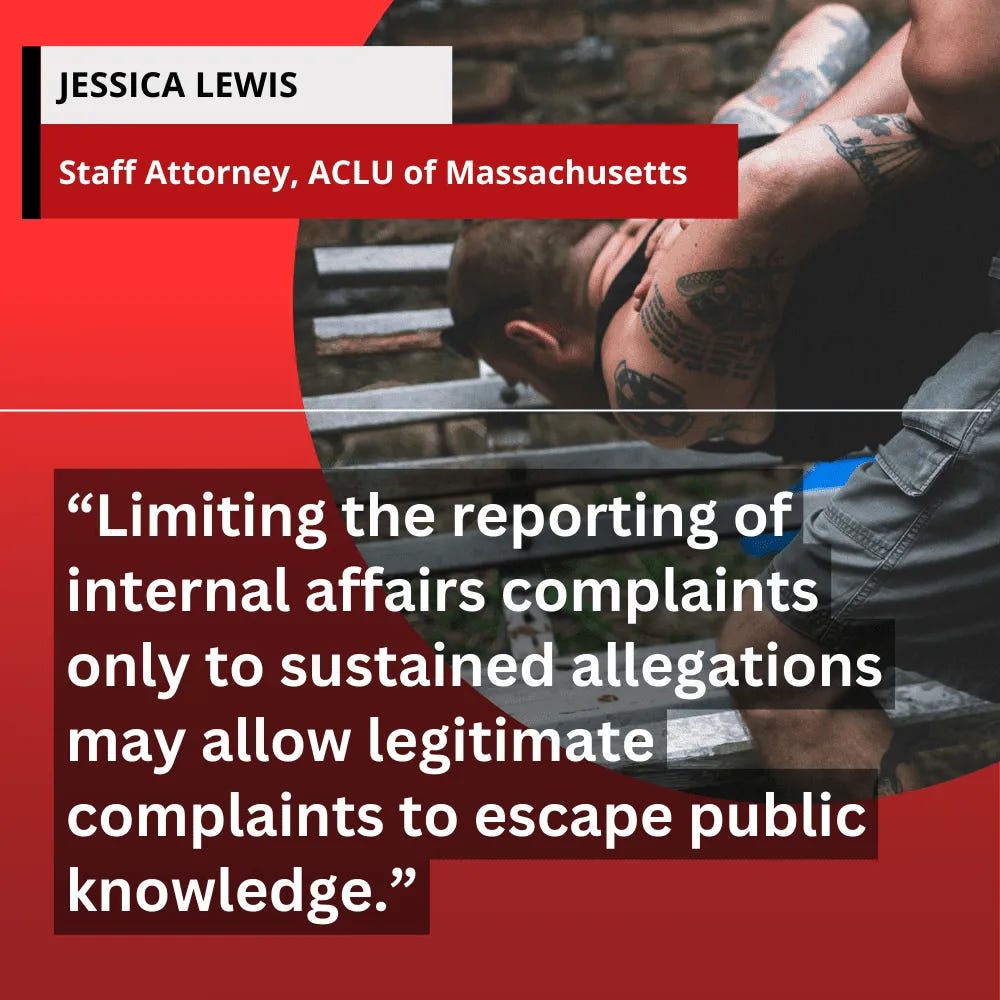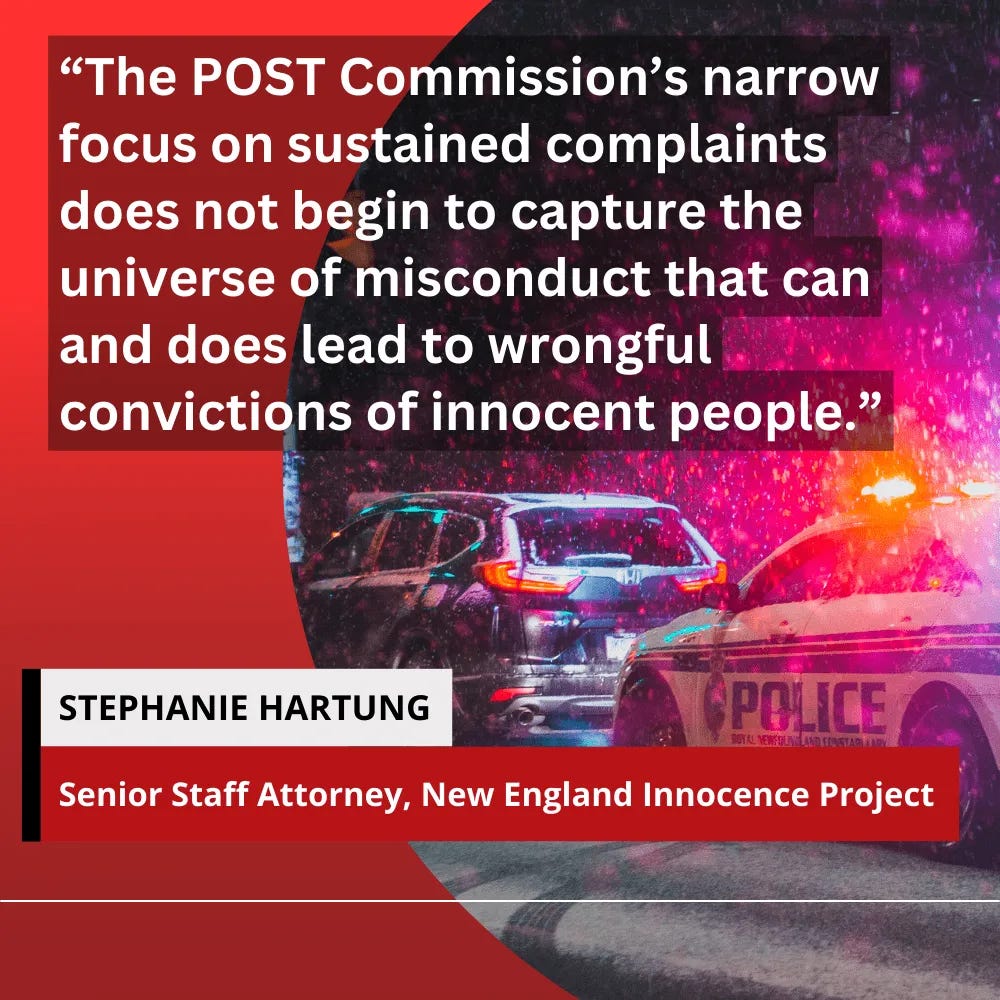Half the story: The shortcomings of Mass police reform
Massachusetts passed historic police certification reform. But even with the POST Commission, the public can’t see which cops have been part of the “officer shuffle.”
Today, I’m presenting a must-read guest story about the shortcomings of the 2020 Massachusetts police reform law contributed by the Boston Institute for Nonprofit Journalism and the Invisisible Institute.
Half The Story
Massachusetts passed historic police certification reform. But even with the POST Commission, the public can’t see which cops have been part of the “officer shuffle.”
By Chris Faraone and Sam Stecklow
After the murder of George Floyd by Minneapolis police in 2020, lawmakers in Massachusetts took an action that advocates had been pushing since at least 2010: creating a system to certify — and decertify — police officers. For decades, Massachusetts had been part of a small outlier of states that had no mechanism to prevent a police officer, once trained, from getting hired after they’d been fired or forced out of another agency for misconduct.
“This bill will allow police departments to make better-informed recruitment and hiring choices while improving accountability,” said then Lt. Gov. Karyn Polito when the bill was filed.
The new agency that oversees that system, the Massachusetts Peace Officer Standards and Training (POST) Commission, has been going through the process of recertifying thousands of existing officers throughout Massachusetts, collecting some disciplinary data about them, and publishing that information on its website. An early peer-reviewed study, using the historical and newly-collected data to look at the impacts of the law, found that it resulted in a reduction of certain kinds of sustained complaints, including about use of force, and suggested that the reforms could be having a “deterrent” effect on misconduct.
“We know that our mandate is about transparency,” POST director Enrique Zuniga said in an interview last year.
However, a series of decisions that Zuniga and POST made have serious implications for the quality of that transparency, and the ultimate usefulness of the data that POST is publishing, experts said.
Despite passing regulations that instruct it otherwise, POST’s database does not include the full employment history of all of the officers that are going through the state’s recertification process — only for officers who have had discipline sustained against them. This prevents the press and public from analyzing data about what are often known as “wandering cops,” who transfer between departments after committing misconduct.
Employment history data are basic information that 27 other states around the country, including Vermont, have released to a national reporting project.
The lack of comprehensive employment history data in Massachusetts is driven home by the launch of a data tool for exactly that information from 17 other states this week.
The tool, launched by the Chicago-based nonprofit public accountability journalism organization Invisible Institute and partner organizations, demonstrates what many Bay State journalists and watchdogs experience daily: commonwealth residents are still subject to less transparency than those in other states.
Before you finish reading this story, please take a moment to subscribe to The Mass Dump for more great local journalism about transparency, police, and the legal system.
Why didn’t POST collect employment history data?
In 2016, the late Roger Goldman, a national expert on police certification and decertification, spoke before the Massachusetts legislature. He explained, based on his experience with police impunity in the St. Louis metro area, that while state law at the time prevented the hiring of officers with felony convictions, there was nothing in place to prevent undesirable cops who rack up ethical or even misdemeanor offenses from leaving one place of employment and resurfacing elsewhere. While people in other careers ranging from realtors to teachers and boxers needed certification at the time, cops did not.
“You’re one of six states that doesn’t have a system that’s really analogous to 150 different occupations and professions,” he said. “It’s just standard stuff, not rocket science … There is no way to decertify an officer for any kind of misconduct. Under current law, another department could hire this officer.” (The number of states without such a system in place is now down to two: Rhode Island and Hawaii.)
It would take several more years of police violence and impunity until Massachusetts lawmakers finally took action and created POST after George Floyd’s murder.
As POST was in the process of standing up its agency, a 2022 WBUR series exposed the “officer shuffle” in Massachusetts: a UMass Dartmouth officer who ended up with the Blackstone police after complaints of sexually harassing and groping a student, a Seekonk officer who landed in Rehoboth after alleged domestic violence, a state trooper who had several troubling incidents involving alcohol and is now a sergeant in Erving.
Lawmakers expressed concern. “One of the main goals of the police reform of 2020 was to make sure that exactly these kinds of transfers wouldn’t happen,” said State Sen. Jamie Eldridge (D-Acton), one of the reform bill’s sponsors.
“What I can guarantee you is that we will have a process — we’re in the middle of that — and we’ll look at them as intended,” Zuniga told WBUR in November 2022.
Regulations that the POST Commission passed in February 2023 call for the agency to create a public-facing database — including “all of [each certified officer’s] employing law enforcement agencies in Massachusetts and elsewhere, and the dates of the officer’s employment,” among other information.
Now, over a year after the regulation was enacted, it’s not clear if the employment histories of a significant portion of the state’s potential “wandering cops” were ever reviewed. That’s because POST’s data collection process largely focused on disciplinary information, rather than specifically seeking out employment history.
“When we came about, one of the things that we started to collect, because it’s in the statute, was disciplinary records [for] individuals,” Zuniga said in a September 2023 interview with Invisible Institute. “The statute directs us to collect both active and transferred officers, so that we have a full picture, ideally, of discipline that happened, perhaps somewhere else.”
“For us to give you a full picture of the employment history — there’s people who have been in different assignments, with an unblemished record without any discipline. It’s going to be a lot harder for us to provide that, because the big effort that we have been conducting is for disciplinary records,” he said.
He said that POST first turned to the state Municipal Police Training Committee (MPTC), which oversees training academies and sets their standards. But they learned that the MPTC sometimes records the agencies of officers who attend their academies, but not always — and never tracks them after they leave an agency.
The employment history data collected by the MPTC is “secondhand and often inaccurate,” confirmed Kaylee Baker, a records manager for the committee, in response to a records request. “Police departments themselves are likely the most accurate source of historic (pre-POST) employment data.”
“There’s a lot of data there,” Zuniga said about the MPTC. “But you know, it turned out to be not very helpful for our purposes. … So unfortunately there’s not a current central repository of everybody’s work history, or assignment history.”
POST does ask officers going through the recertification process to list their previous agencies as an answer in its candidate packet.
Experts questioned why, upon realizing the MPTC didn’t have the information they wanted as electronic data, POST didn’t create this database itself.
“It doesn’t make any sense that the previous employment of these officers wouldn’t be tracked and recorded if the ultimate goal was to prevent police misconduct from occurring,” said Justin Silverman, executive director of the New England First Amendment Coalition. “We’re only getting half the story without this information.”
Zuniga said in his interview with Invisible Institute that, in the push for disciplinary data and recertification of officers, collection of previous employment history fell by the wayside.
“To be honest, historically, that’s not something that has surfaced as a big priority, frankly, or on equal footing as the [other] priorities,” he said. “I don’t want to minimize it, but I just want to mention there were other priorities.” Namely, collecting disciplinary data. But there would be problems there, too.
Kneecapped misconduct data collection
Beyond failing to collect the employment history data for all officers, POST appears to have violated at least the spirit of the statute that created it, according to some experts, by severely curtailing the amount of disciplinary information it collected from local departments.
This means that, while “wandering officers” who were fully disciplined by their agencies and then moved to another are represented in the database, that definition excludes the vast majority of police misconduct complaints — which are not sustained by their agencies.
The same regulations POST passed in February 2023 also require the public database to include “complaints against the officer” and “the nature of any discipline imposed as a result” — clearly envisioning the database including cases in which the officer is not disciplined at all. POST began collecting spreadsheets from departments around the state containing all of their responsive complaints.
But that same month, a letter from Zuniga went out instructing departments to start over — and provide far less information. “Please note that we are only requesting that you submit sustained disciplinary records as part of this resubmission,” he wrote. “POST will only publish ‘Sustained’ records, and those are the ones that need to be validated at this point.”
By this time, POST had already attempted to pass a version of its regulation that explicitly excluded internal affairs cases that ended in a “unsustained” or “unfounded” finding from the public database — and was just as explicitly rebuked.
Reminding the Commission that the statute that created it called for the collection of data on “any internal affairs complaint,” Jessica Lewis, an attorney with the ACLU of Massachusetts, wrote in December 2022, “Limiting the reporting of internal affairs complaints only to sustained allegations may allow legitimate complaints to escape public knowledge.
“When an allegation of police misconduct is not sustained by the relevant department, it does not follow that the allegation was necessarily false,” Lewis continued, citing the example of a Fall River Police officer who was able to skirt accountability throughout his 19-year-long career.
That proposed weaker language did not make it into the final regulation — but the commission used another tactic, by making a new subcategory under the listing of information “which could potentially impact officer health or safety,” and is therefore exempt: “Information concerning any complaint or disciplinary matter that has not been resolved adversely to the officer, unless the matter was resolved in a manner that the Commission determines to have been unwarranted.”
In its December 2022 meeting, as the commission was finalizing its database regulation, POST commissioners reacted strongly to comments from the ACLU of Massachusetts, Committee for Public Counsel, and others who called for the public database to include all misconduct cases.
“Putting in unsustained or unfounded or pending possibly false complaints, we’ve discussed this at length in the past,” said Lawrence Calderone, a POST commissioner and president of the Boston Police Patrolmen’s Association. “According to the statute, we’re supposed to be looking out for the wellbeing and health of everyone in the law enforcement field, and it doesn’t do officers any good on the street if false complaints will be part of an open database.” He was supported by commissioner Hayna Bluestone, a forensic psychologist.
“Some concerns brought by stakeholders about publishing unsustained complaints were that it would lead to unintended effects, like de-policing,” Alia Spring, POST’s communications manager, added in response to inquiries from Invisible Institute and BINJ.
She also pointed out that the agency is now collecting information about all complaints of misconduct in Massachusetts going forward, including those that don’t end in discipline.
But officials still intend to use the same “health and safety” provision to withhold case-specific information about unsustained cases in perpetuity, at least from the database that it publishes. And for historic cases, after asking for agencies to resubmit their data, POST never collected anything except for sustained investigations.
Gaps in the data
Even in the public data that has been released, though, the information about discipline is scant — and, as Dan Atkinson has written for BINJ, can sometimes be better obtained elsewhere, like through the Civil Service Commission.
Jeff Raymond, an independent journalist in Millbury, took it upon himself in 2023 to request the data that hundreds of local departments had prepared and sent in to POST, before the agency instructed them to start all over again. (He obtained the data over strenuous police union objections.)
The gaps between what POST ultimately published, and what Raymond showed they were initially receiving from local departments through his MassTransparency project, are stark.
Springfield Police Det. Gregg Bigda, for example, who has a history of excessive force complaints, appeared as a relatively middle-of-the-road officer in POST’s public data — due more to Springfield PD’s low rate of sustaining misconduct, and discipline being overturned on appeal, rather than Bigda’s style of policing actually being standard. POST is now in the process of decertifying Bigda.
Reporting has shown that agencies including the Amherst, Boston, Holyoke, and Northampton police also sustain complaints of misconduct at extremely low rates, likely resulting in POST’s public data obscuring the true nature of policing in these cities.
“The POST Commission’s narrow focus on sustained complaints does not begin to capture the universe of misconduct that can and does lead to wrongful convictions of innocent people,” said Stephanie Hartung, a senior staff attorney for the New England Innocence Project. She said that when past misconduct is uncovered in the course of an exoneration investigation, “there is rarely, if ever, an underlying ‘sustained’ finding by the police department.”
Because Massachusetts departments have shown they are more likely to sustain complaints filed by an officer’s supervisor than a civilian complaint, limiting data publication to just sustained cases fails to capture the “full picture” of an officer’s policing history, said civil rights attorney Howard Friedman.
Given that POST is “still in its beginning stages,” he added, “I would hope they would eventually change this view.”
Spring, POST’s communications manager, wrote in an email that the commission doesn’t intend to.
“Since inception, the POST Commission has internally tracked and collected the results of all credible complaints and incidents reported by the public and agencies regardless of the outcome. POST begins tracking complaints before the outcome is determined. Once the complaint/incident is closed, cases with sustained findings are posted publicly in the Historical Disciplinary Database,” she wrote.
“When determining the type of information included in the Historical Disciplinary Database, POST weighed the comments and concerns of all stakeholders, including the public, officer[s] and agencies, and the health and safety of officers, as directed by the statute,” she continued. “In the future, POST intends to release aggregate data about unsustained complaints, which will highlight differences in complaint patterns for agencies throughout the state.”
Zuniga told Invisible Institute that policing custom in Massachusetts should additionally protect against the “officer shuffle.”
“The hiring department is supposed to do a background check on that individual,” he said. But “I cannot tell you that everybody did that. It is conceivable that a hiring department might not have known about a particular discipline, let’s say or a particular complaint, that maybe was not sustained.
“So it’s conceivable, but my understanding of these agencies is they share information and they look to each other’s experience with a particular person as they do background checks.”
Now, he said, the statute requires a background check for every hire. That, in addition to the data POST is collecting, will help agencies.
“One of the reasons of putting all the information that we put out is to help the agencies themselves,” he said. “To say, here’s a quick list of what the POST has to say about this guy if we’re looking to hire somebody who’s already experienced.”
Mustafa Demir is a professor at the John Jay College of Criminal Justice who co-authored the September 2024 paper digging into the effects of the Massachusetts POST reforms, published in the Journal of Criminal Justice. He said in an interview that his study, which found that the POST played a deterrent effect on sustained findings of misconduct, was only able to take into account the data that POST had determined was worth collecting and publishing, and that more studies should be done that take into account cases with non-sustained findings.
“There are a couple of studies that can be done. One of them is comparing all complaints with the sustained complaints,” he said.
But that relies on POST having collected accurate data from departments around the state.
The stakes
Reporting in recent years has also raised concerns around prosecutors’ compliance with obligations to collect and disclose police misconduct information in criminal cases — obligations usually referred to under U.S. Supreme Court decisions called Brady v. Maryland and U.S. v. Giglio. In some agencies, when an officer necessitates a disclosure under Brady or Giglio, they are automatically fired or pulled off the street.
In 2020, WBUR found that while some prosecutors’ offices kept lists of officers with past issues around their credibility, others had no system to ensure that legally-required disclosures were made.
This — combined with the inability to strip officers of their certifications until the POST Commission was created — meant that even if a department notified a prosecutor’s office of misconduct requiring disclosure to defendants, officers could escape having their career hampered by simply moving to a new jurisdiction.
A 2023 Massachusetts Appeals Court ruling expanded the information that prosecutors have to seek and provide to defense attorneys to include pending investigations and civil lawsuits, but defense attorneys and public defenders have continued to claim that they’re not receiving the records that they should.
In January, the Supreme Judicial Court ruled that the Springfield Police Department had failed to investigate the “pattern or practice” of excessive force and lying on reports that the U.S. Department of Justice had found in its 2020 investigation — or make its required disclosures to defense attorneys. Lewis, with the ACLU of Massachusetts, wrote that the decision should prompt all commonwealth DAs to “revisit” their Brady practices.
That same month, the Committee for Public Counsel Services (CPCS) sued the Massachusetts State Police for its “regular practice” of violating disclosure obligations in Worcester County, which led to a judge calling the MSP’s Brady violations “egregious” and that they should lead to new trials for several defendants. Those Brady issues with MSP were showcased by the significant questions in Trooper Michael Proctor’s testimony in the prosecution of Karen Read over the summer.
These reported issues raise the question of whether a prosecutor’s office will always be aware of an officer’s misconduct with their current agency, let alone a previous agency — especially without central data telling them, or defense counsel, where an officer has worked.
“I’m dubious of the ability [of] these overwhelmed prosecuting agencies to comply with what the Constitution requires in terms of collecting and disseminating important exculpatory evidence,” said Luke Ryan, a Northampton criminal defense and civil rights attorney.
The gaps in the data “really illustrate the point that at its core, the whole Brady problem is that as defense attorneys, we don’t know what we don’t know,” said Shira Diner, a longtime public defender with CPCS who now leads Boston University’s Defender Clinic, as well as the Massachusetts Association of Criminal Defense Lawyers.
Even though U.S. Supreme Court precedent and Massachusetts court rules state the opposite, “It’s always been this skewed process by which defense lawyers are the ones who have to dig,” she said. “The prosecutors don’t do it as a matter of course, and they certainly don’t look into where someone worked prior. It would be really hard for a defense lawyer or defendant to find that information, and that’s a problem.”
Who are the wanderers?
The commonwealth’s liberal political reputation aside, it holds the distinction of being the only state where the legislature, judiciary, and governor’s office all claim exemptions to the public records law. Transparency in Massachusetts in general fares poorly in comparison with other states. Media Nation blogger and Northeastern University journalism professor Dan Kennedy documents the worst offenses, giving out “Muzzle Awards” for “transgressions against freedom of expression.”
As departments across Massachusetts have said they are facing a “desparate” hiring, recruitment, and retention shortage, experts have raised alarms that this could exacerbate the issue of “wandering cops” — necessitating more disclosure, and better data about the histories of officers who could fill these roles.
Agencies including the Chicopee, Malden, and Provincetown police departments have introduced four- and five-figure signing bonuses for lateral transfer officers from other agencies.
However, “Agencies … have only a limited ability to learn about any misconduct an officer may have committed at a prior agency,” researchers with the Police Executive Research Forum wrote in a 2023 report on the police “staffing crisis.” It cautioned agencies to “be wary of lateral recruitment.”
“Every agency is screaming for more police officer applicants, and so that makes hiring and the acceptance of officers who may have questionable backgrounds a problem for us,” said Patrick Solar, a former police chief in Genoa, Illinois, and a criminal justice professor at the University of Wisconsin-Platteville.
“To hire people to fill the ranks, we may intentionally or inadvertently lower our standards. It brings in the opportunity for officers who may run into trouble moving from one agency to the next.”
Silverman, of the New England First Amendment Coalition, called on POST to build the database set out in the regulations — including full employment history.
“The technology is there,” he said. “The need is there. We just need some leadership within this commission to either begin tracking this information, or demanding it from other agencies so it can be used when determining whether or not an officer is fit for duty.”
Sam Stecklow is an investigative journalist and FOIA fellow with Invisible Institute, a nonprofit public accountability journalism organization based in Chicago. Follow him on Twitter at @samstecklow or email him at sam@invisibleinstitute.com.
Chris Faraone is the editorial director of the Boston Institute for Nonprofit Journalism. Follow him on Twitter at @Fara1 and email him at fara1@binjonline.org.









